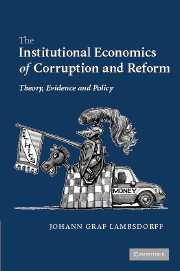Book contents
- Frontmatter
- Contents
- List of boxes
- Acknowledgements
- A roadmap to this book
- 1 Introduction
- 2 Enemies of corruption
- 3 What is bad about bureaucratic corruption? An institutional economic approach
- 4 The dilemma of the kleptocrat: What is bad about political corruption?
- 5 Corruption and transactions costs: The rent-seeking perspective
- 6 Making corrupt deals: contracting in the shadow of the law
- 7 Exporters' ethics and the art of bribery
- 8 How confidence facilitates illegal transactions: An empirical approach
- 9 Corrupt relational contracting
- 10 Concluding thoughts
- Appendix: Technical Details to the Transparency International Corruption Perceptions Index
- References
- Subject index
9 - Corrupt relational contracting
Published online by Cambridge University Press: 05 November 2009
- Frontmatter
- Contents
- List of boxes
- Acknowledgements
- A roadmap to this book
- 1 Introduction
- 2 Enemies of corruption
- 3 What is bad about bureaucratic corruption? An institutional economic approach
- 4 The dilemma of the kleptocrat: What is bad about political corruption?
- 5 Corruption and transactions costs: The rent-seeking perspective
- 6 Making corrupt deals: contracting in the shadow of the law
- 7 Exporters' ethics and the art of bribery
- 8 How confidence facilitates illegal transactions: An empirical approach
- 9 Corrupt relational contracting
- 10 Concluding thoughts
- Appendix: Technical Details to the Transparency International Corruption Perceptions Index
- References
- Subject index
Summary
Introduction
“Why are so many politicians lawyers? – because everyone employs lawyers, so the congressman's firm is a suitable avenue of compensation, whereas a physician would have to be given bribes rather than patronage.”
Stigler (1971)Corruption, no doubt, is regarded as one of the modern evils. It is carried out by those with a criminal intention and motivated by greed. Yet, if this simple explanation were valid, why would we have to face in reality some disturbing counterexamples? Why, in particular, do we face a significant pattern where corrupt people tend to be involved in a variety of charitable institutions? Why do many bribers and bribees engage in an assortment of regular business transactions and political initiatives where they are regarded as trustworthy and honest partners? Our viewpoint of them as criminals contradicts their social engagement. The trust they enjoy in their regular relations sounds rather controversial, given their misuse of entrusted power.
A straightforward argument would, certainly, point out that corrupt actors must be entrusted with power before misusing it. There must be opportunities for corrupt misbehavior. These opportunities commonly arise where public office holders are in a monopoly position, have discretion in interpreting, applying, or changing the law, and lack accountability (Klitgaard 1988: 75).
- Type
- Chapter
- Information
- The Institutional Economics of Corruption and ReformTheory, Evidence and Policy, pp. 209 - 224Publisher: Cambridge University PressPrint publication year: 2007
- 6
- Cited by



